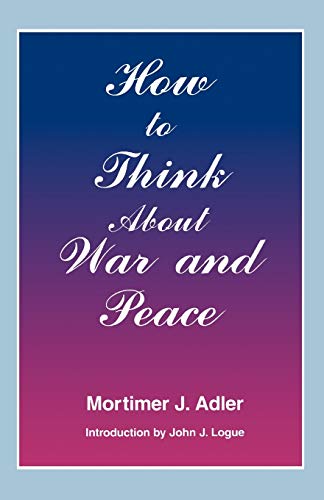All books / Book
How to Think About War and Peace

| Full title: | How to Think About War and Peace |
|---|---|
| ISBN: | 9780823216437 |
| ISBN 10: | 0823216438 |
| Authors: | |
| Publisher: | Fordham University Press |
| Edition: | 1 |
| Num. pages: | 307 |
| Binding: | Paperback |
| Language: | en |
| Published on: | 1995 |
Read the reviews and/or buy it on Amazon.com
Synopsis
Mortimer J. Adler Wrote How To Think About War And Peace In The Summer Of 1943, Two Years Before An Atom Bomb Exploded Over Hiroshima And Brought The Second World War To An End. Because Of Its Relevance To Our Own Time, Fordham University Press Has Reprinted Adler's Important Book, Bringing It Up To Date With An Introduction By John Logue. In The Book, Adler Writes That Anarchy Is An Appropriate Name For The Existing System Of Nation States And That War Will Be The Inevitable Result. Adler Urges That This System Be Replaced With A Democratic World Federation With Limited But Adequate Powers. The Government Of Such An Organization Should Be Concerned Not Only With Law And Order But Also With Justice And Human Rights. How To Think About War And Peace Discusses Immediate Issues With Eternal Principles, Viewing Present Problems In The Larger Perspective That History And Philosophy Can Provide. This Book Engages In A Timeless Project Not Contingent On Current Events, But Cumulated From A Continuing History Of The Battle Between War And Peace. Written In The Midst Of The Second World War, Adler's Purpose Was Not To Proffer How To Make Peace After The End Of The War, But Rather, To Instruct As To How To Think About War And Peace And How To Continue This Process To Maintain Peace. Pt. 1. The Problem Of Peace. 1. The Questions Men Must Face. 2. The Answers Men Have Given -- Pt. 2. The Possibility Of Peace. 3. The Inevitability Of War. 4. The Abnormality Of War. 5. What Peace Is. 6. How Peace Is Made. 7. The Only Cause Of War. 8. The Right And Wrong Of Sovereignty. 9. The Peace Of Angels. 10. Civil War. 11. The Degrees Of Peace. 12. A Society Of Men. 13. The Inexorable Alternative -- Pt. 3. The Probability Of Peace. 14. An Optimistic View Of History. 15. The Future Of Democracy. 16. Progress Toward Peace. 17. The Physics Of Peace. 18. The Economic Community. 19. The Obstacles To Peace. 20. Revolution For Peace. 21. Education For Peace -- Pt. 4. The Practicality Of Peace. 22. Ends. 23. Means. 24. The Long Run. By Mortimer J. Adler ; Introduction To The 1995 Edition By John J. Logue. Originally Published: New York : Simon And Schuster, 1944. Includes Bibliographical References.